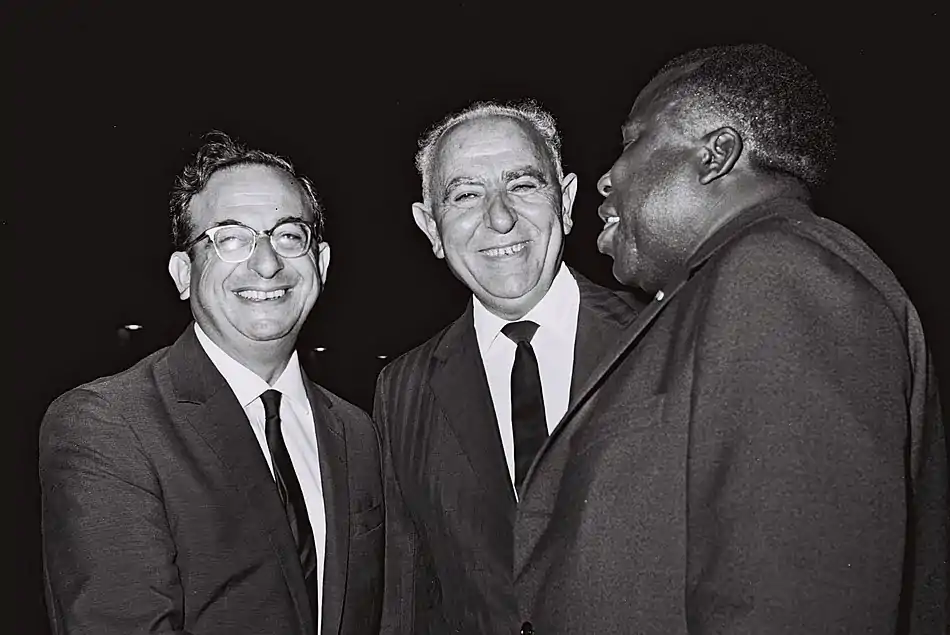Sylvestre Kongolo Mudingayi | |
|---|---|
Sylvestre Mudingayi in Israel, August 1966 | |
| President of the Senate of the Democratic Republic of the Congo | |
| In office September 1965 – 24 June 1967 | |
| Preceded by | Isaac Kalonji |
| Succeeded by | position abolished[lower-alpha 1] |
| Personal details | |
| Born | 11 November 1912 Lusambo, Kasai Province, Belgian Congo |
| Died | unknown |
| Political party | Parti National du Progrès Front Démocratique Congolais |
Sylvestre Mudingayi (11 November 1912 – ?) was a Congolese politician who served as the President of the Senate of the Democratic Republic of the Congo from October 1965 until June 1967.
Biography
Sylvestre Mudingayi was born on 11 November 1912 in Lusambo, Kasai Province, Belgian Congo[1] to a Luba family.[2] In 1932 he became a chief clerk at the Banque du Congo Belge. He was a member of the évolué social class.[3] In 1945 he chaired the Cercle d'Agrément Prince Léopold III de Lusambo.[4]
Political career
Mudingayi was classified by Christian missionaries as a "socialist" due to his advocacy for the establishment of secular schools.[1] In 1953 he traveled to Belgium where he was received by the Liberal Party.[5] In March 1959 he was appointed by the Governor-General of the Congo to serve on the consultative Conseil de Gouvernement.[6] Mudingayi later became president of the Kasai chapter of the Parti National du Progrès (PNP). He founded and became editor of the leftist anti-clericalist newspaper La Lumière, a bimonthly publication of the party.[1]
Mudingayi participated in the Belgo-Congolese Round Table Conference of 1960 that earned the Congo's independence.[7] While campaigning for the PNP in the Luputa region of Kasai in March for the upcoming elections, he was assaulted by opposing political activists.[8] His injuries were severe and he was forced to make a near-total withdrawal from politics.[7]
In September 1965 Mudingayi was elected President of the Senate as a member of the Front Démocratique Congolais (FDC) in a surprise victory over the incumbent, Isaac Kalonji, 57 votes to 54.[9] He served until the enactment of a new constitution on 24 June 1967.[10]
Notes
- ↑ The Senate was permanently dissolved and was not reinstated until 2003 under the chairmanship of Pierre Marini Bodho.
Citations
- 1 2 3 CRISP 1959, paragraph 64.
- ↑ Makombo 1998, p. 460.
- ↑ Makombo 1998, p. 314.
- ↑ Tousignant 2009, p. 98.
- ↑ Makombo 1998, p. 226.
- ↑ Artigue 1960, p. 84.
- 1 2 House Committee on Foreign Affairs 1960, p. 42.
- ↑ Wa Tshibangu 1976, p. 145.
- ↑ African World 1967, p. xxiii.
- ↑ Senat 2010, p. 2.
References
- "L'affaire Kalonji et les problèmes du Kasai". Courrier Hebdomadaire du CRISP (in French). Centre de recherche et d'information socio-politiques (31): 9–18. 1959. doi:10.3917/cris.031.0009.
- Artigue, Pierre (1960). Qui sont les leaders congolais? (in French). Éditions Europe-Afrique.
- "Discours Prononce par le President du Senat a L'Occasion de la Commemoration du Cinquantenaire de la Creation du Senat de la Republique Democratique du Congo" (PDF) (in French). Kinshasa: Senat de la Republique Democratique du Congo. 23 June 2010. Retrieved 5 November 2017.
- Makombo, Mutamba (1998). Du Congo belge au Congo indépendant, 1940-1960: émergence des "évolués" et genèse du nationalisme (in French). Kinshasa: Institut de formation et d'études politiques. OCLC 52312642.
- Wa Tshibangu, Tshimanga (1976). Histoire du Zaïre (in French). Éditions du Ceruki. OCLC 652145768.
- Tousignant, Nathalie (2009). Le manifeste Conscience africaine (1956): élites congolaises et société coloniale : regards croisés (in French). Facultés universitaires Saint-Louis. ISBN 9782802801900.
- "Mr. Tshombe Dismissed : Mr. Kimba Forms New Government". African World. London: African Publications Limited. 1967 [1965]. OCLC 12032018.
- United States House Committee on Foreign Affairs (1960). Staff Memorandum on the Republic of the Congo. United States Government Publishing Office.
